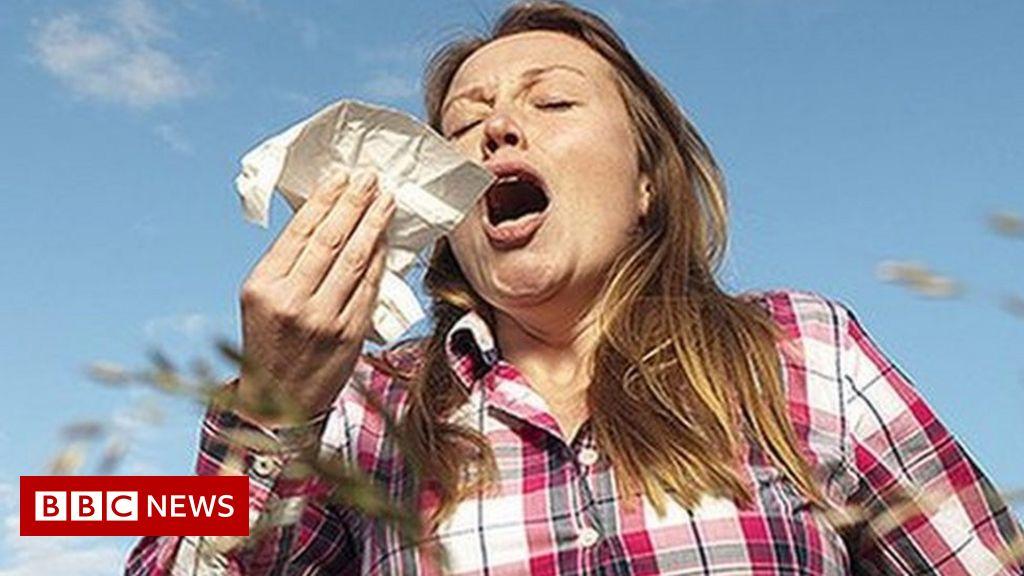Why does my hay fever seem so bad this year?
By Michael BaggsNewsbeat reporter
Share pageAbout sharingFexofenadine, Cetirizine, Fluticasone Propionate, Loratadine: If you're a hay fever sufferer, this might be a recipe you recognise.
These are just some of the anti-allergy drugs people turn to when their symptoms flare up.
And right now, a lot of people seem to think their hay fever is worse than ever.
You just need to look on Twitter to see people talking about their symptoms and how badly they're struggling in 2021.
The BBC is not responsible for the content of external sites.View original tweet on TwitterThe BBC is not responsible for the content of external sites.View original tweet on TwitterThe BBC is not responsible for the content of external sites.View original tweet on TwitterOthers have joked it's less "hot girl summer" and more "hot girl suffer".
Hay fever sufferers have also been warned to be extra aware this summer, because new coronavirus symptoms are said to be very similar to reactions many of us have to the pollen blowing through the window.
It's peak time for pollen
Holly Shaw is the nurse advisor for Allergy UK. She says this year has been especially busy for people who work in allergies - but not because symptoms are really much worse this year.
"When the Covid-19 pandemic first hit, we noticed that people came in saying their appointments had been delayed or postponed," she tells Radio 1 Newsbeat.
Like so many other medical needs, allergy treatment was delayed because of the number of people with Covid who needed NHS support.
"They leant towards charities even more so to support them during that time."
And it's to be expected that hay fever sufferers will be struggling more at the start of summer.

"At the moment we're in the peak of a really nice warm spell, there are light winds - which is very favourable for moving pollen around - and we're having days of high pollen counts," says Holly.
"So it isn't unusual for me to hear patients reporting their hay fever symptoms are really miserable."
The start of summer is also grass pollen season - and that's what affects 80% of people who suffer from hay fever.
Tree pollen comes in spring, grass in summer and weed pollen does the damage come autumn.
Holly says that people's "perception" of their symptoms is probably making it feel like things are worse this year, especially after spending so long indoors.
But she doesn't believe lockdown and self isolating will have made sufferers any more susceptible to pollen this year.
Most people will be able to treat themselves with a daily antihistamine, but people with persistent symptoms can see their GP, who can prescribe sprays to work alongside over-the-counter medication.
What does the NHS say?
There are several other things you can do, as recommended by the NHS, such as putting Vaseline around your nostrils to trap pollen and stop it going up your nose.
It also suggests wraparound sunglasses to keep pollen out of your eyes, showering and washing clothes when you've been outside and making sure you vacuum and dust your home regularly.
And it goes without saying, if you suffer from hay fever having flowers indoors is a bad idea. The NHS also recommends spending as much time as possible indoors and away from cut grass - which is a tough decision to make in a summer after lockdown.
The honey 'myth'
But if anyone tells you eating honey regularly, especially locally made honey, will help your symptoms then they are, sadly, wrong.
"That's one of those myths that comes around every year," says Holly.
"There isn't any evidence to support that. There's no research, think about where the problem comes from - the trees, weeds and grass.
"It's bees pollinating flowers. So they're taking the pollen from the flowers."
She says there's no evidence that much pollen makes it into honey and then makes it into people, and says experts "can't really make the parallels" that liken eating honey to a form of immunotherapy.
"Although it is a very nice product, and if people are enjoying it, then there's no reason why they can't continue to do so."
Follow Newsbeat on Instagram, Facebook, Twitter and YouTube.
Listen to Newsbeat live at 12:45 and 17:45 weekdays - or listen back here.








